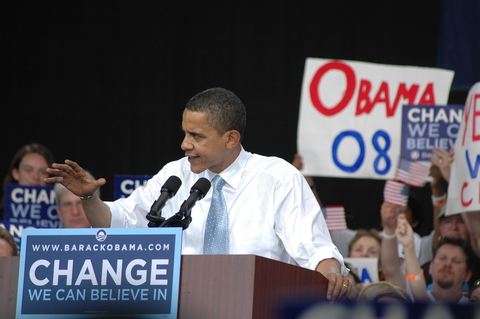|
© Endriashz | Dreamstime.com - Barack Obama Photo
For some time, I've been thinking about why Senator Bernie Sanders's call for a "political revolution" does not get the response that I think it deserves from the Left. He's right that there's a lot to change in the way American politics functions and that money enjoys an unfair advantage. Indeed, democrats, progressives, and liberals agree.
So, why does Sanders's grand call for a "political revolution" deflate as soon as it is shouted? Why doesn't it invigorate everyone on the Left? For sure, Sanders is not lacking conviction and the veracity of his mantra is acknowledged. Perhaps, not enough people know who he is or understand his ideas. Or, maybe the Democratic establishment is not really interested in a "future we can believe in," to borrow another slogan from Sanders.
Sanders's supporters have tried to pinpoint the thorn(s) in their campaign. Some say his lack of visibility is the problem. Yes, a lack of media coverage plays a role. Others find fault with a corrupt Democratic establishment, namely the infamous superdelegates. But as chairwoman of the Democratic National Committee Debbie Wassermen Shultz accurately stated, superdelegates "have never been a determining factor in who our nominee is since they've been in place since 1984." And another charge is that people who don't support Sanders aren't really interested in real change. I doubt those on the Left who have yet to be captivated by Sanders' impassioned rallying cries are simply disinterested in improving our American society. In fact, they are committed to building on the political gains made under Pres. Obama in the past 7 years.
The main problem lies elsewhere. But there are some obvious drawbacks to his campaign that have debilitated his momentum--such as the temperament of Sanders's uncompromising rhetoric waged at his own Democratic colleagues and the poor choices of political surrogates' (i.e. Cornel West) he's chosen to represent him to certain demographics. These misplayed moves suggest a missed opportunity or, worse, a fundamentally flawed strategy. Sanders should have strategized to build on and take advantage of the Obama Phenomenon which would have more than likely corralled enough of the Democratic electorate to carry him to the Oval Office. Instead, he seems to shout against the currents that have created the possibility for his campaign to exist in the first place. The reverberations still resounding from the groundbreaking Obama Phenomenon are drowning Sanders's slogans, particularly the "political revolution." The Obama Phenomenon, itself, is the political revolution that made Sanders's platform possible. That is, the election of President Obama in 2008 is the precursor to the momentum Bernie is presently surfing. (Some might rightfully prefer to say the Obama Phenomenon is just one development among others of a longstanding revolution already underway.) My point here is that the call for a political revolution from a 2016 Democratic presidential candidate, however noble, is redundant. In fact, it comes close to sounding dissonant in light of an incumbent enjoying a 51% approval rating—the same as President Reagan's in 1988, who endured a much less partisan political climate. Indeed, many disagree with me. For one, some hold that Obama is not much of a liberal. Others believe his presidency hasn't done much to get money out of politics, (Not to mention that Obama was the first president since Nixon to decline public campaign funds for roughly $80 million dollars to raise a record breaking $750 million.) And yet others will go as far as saying Obama's presidency was not only a failure for the progressive cause, it advanced the Bush Doctrine and other conservative agenda. I am not responding to those claims. My website allaboutbarackobama.com will resolve those issues. Here, I give three reasons why Obama's election in 2008 was an undeniable political revolution for the Left that still matters today. Ground Breaking Electorate Victories First, the 2008 democratic primary result was one of the most enduring, tight and expensive in history. The race was so close that it was thought superdelegates were needed to break the virtual tie. But they followed the will of the majority, aligning with the final outcome in the regions they represent. In other words, there were no, what some call, faithless electors in 2008. As a Democratic nominee in modern presidential history, Obama won by the largest majority (52.9%), notwithstanding President’s Lyndon Johnson and Franklin Roosevelt. Obama’s lead over Senator John McCain in the general election by a margin of approximately 9 million popular votes was the largest since Reagan's victory over Walter Mondale in 1984. To achieve such a record, Obama won traditional red state: Colorado, Indiana, Pennsylvania, North Carolina, and Virginia; and the swing states Florida and Michigan. In fact, Obama won key electoral states in every region in the USA apart from Texas--in the Northeast, New York, Pennsylvania, and New Jersey; in the Midwest, Illinois, Michigan, and Ohio; in the South, Florida; in the West, California. Obama earned a whopping 365 electoral votes, and won the highest number of popular votes ever, a total of 69 million votes, and that is a phenomenal feat in the history of the USA. Also, his presidency pulled the highest voter turnout (61.7%) to date. More can be said, but this makes it clear that Obama's victory in 2008 was, by many margins, extraordinary. (Data for this section from Larry J. Sabato ed., The Year of Obama: How Obama Won the White House, 2010.) The Eclipse of the Reagan Era Obama's victory in 2008 transformed the narrative of American history. The inauguration of the Age of Obama ended the Reagan Age. Under Reagan, conservatism proliferated throughout the American government. The courts were all but literally painted red, as he appointed 3 Supreme Court Justices and 376 federal judges. (That is more judges than any other president appointed). During Reagan's reign, the gains made after the Civil Rights Movement were suppressed. And he sicced his deregulation policies on the American economy, whose damage can be felt today. However, Obama's political moves--executive orders, legislation, initiatives and vetoes—launched a decisive liberal and progressive agenda. To name a few: Affordable Care Act, Dodd-Frank Act, LGBT rights, White House Initiative on African American Educational Excellence, the Iran Deal. Inclusive Democracy The most revolutionary aspect of Obama's political revolution is that it is a culmination of multiple converging strands of tensions. In other words, it had no single "trump card," as Julianne Malveaux explains in her essay "What Trumped? Race, Class, Gender, Generation and Economy and the 2008 Elections." (Charles P. Henry et al., eds. The Obama Phenomenon) Obama's revolution was propelled by a multiracial and multicultural coalition of citizens who were willing to find common ground with one another in order to make America more responsive to its diversity. Millions of blue collar workers and unemployed professionals voted for Obama to renovate the economy. Women and the LGBT community aligned with Obama to tear down the economic and political walls marginalizing them. And the youth were inspired by his commitment to education and climate change. There are many more reasons why Obama has become one of the most consequential presidents, as many have already concluded. Moving into the final rounds of the 2016 election, candidates will be measured against Barack Obama's organic, phenomenal ascendancy, his inspirational rhetoric of hope for positive change through civic engagement, and a host of iconic accomplishments in the face of unprecedented obstruction. The 2008 political revolution will, indeed, influence the strategies, tactics, and goals of presidential candidates for the rest of the 21C. Any candidate seeking the Democratic nomination would be wise to harness its potency.
2 Comments
|
About the blogThis is Kasaun's blog on the significance of voting, particularly in America. The goal is to get every American voting in local and national elections. Archives
July 2018
Categories |


 RSS Feed
RSS Feed
